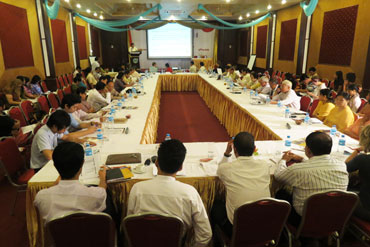"We need to adopt a new style of budgeting," said an eminent economist and member of the council of economic advisors to the president, while speaking at a roundtable discussion on Myanmar's budget process on Thursday.
 Academics, economists and officials discuss the development of democratic local budgets at a roundtable event organized by ActionAid at the Coriander Leaf Restaurant in Yangon on February 28. Credit: ActionAid
Academics, economists and officials discuss the development of democratic local budgets at a roundtable event organized by ActionAid at the Coriander Leaf Restaurant in Yangon on February 28. Credit: ActionAid
"We have committed so many mistakes. Please do not replicate these mistakes," said Dr. Aung Tun Thet.
With the right framework, Aung Tun Thet expressed hope that Myanmar could become a middle income nation within the decade. He said that the problem with the current regional governments is that "they have no money" and that the present "top-down" mind-set needed to change.
He called for devolution, openness and transparency in the entire budgeting process, and praised the event, saying that for the first time politics and economics could be discussed at an open forum.
Another speaker, Zaw Pe Win, a principal at the HRD Training Centre, said, “Local governments need to be empowered to collect more revenues and to be able to finance their own expenditures."
Previously, the Myanmar government used a consolidated fund system and all expenditures of the country were administered by the central government. Following the 2008 constitution, local governments were put in place and were authorized to manage their own budgets following approval by the central government.
During the 2011-12 fiscal year, Myanmar's budget deficit was more than 2.3 trillion kyat (US $2.7 billion), the Public Accounts Committee told the Myanmar Upper House of Parliament.
The February 28 event was organized by the NGO ActionAid and was entitled “A Pathway for the Emergence of Democratic Local Budgets” and consisted of range of experts who addressed specialist issues from regional planning, to gender budgeting and education.


